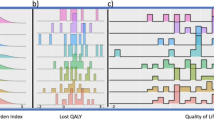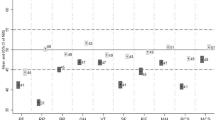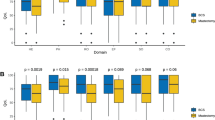Abstract
This study aimed to assess the proportion of patients with advanced breast cancer who report benefit from first-line palliative chemotherapy using a simple global measure of wellbeing and to identify factors predicting benefit. A consecutive series of women with advanced breast cancer undergoing first-line palliative chemotherapy was evaluated. The main outcome measure was patient report of overall wellbeing assessed at post-treatment interview. Physical, psychological and functional status were assessed using the Rotterdam Symptom Checklist (RSCL) on three occasions (pretreatment, at the start of the third cycle and post treatment). It was planned that treatment would be discontinued after six cycles (i.e. 18-24 weeks). One hundred and sixty patients started treatment, of whom 155 were assessable for quality of life. After treatment, 41 (26%) patients reported they felt better, 29 (19%) felt the same and 34 (22%) felt worse than they did before treatment. The other 51 (33%) patients either died or stopped attending the hospital before the post-treatment interview and were assigned as treatment 'failures'. Patients who reported feeling better after treatment had improvements in psychological distress (P < 0.0001), pain (P = 0.01), lack of energy (P = 0.02) and tiredness (P = 0.02), as well as improvement in functional status (P = 0.07). Feeling better was also correlated with disease response (P = 0.03). Feeling worse after treatment or treatment 'failure' was predicted by the pretreatment presence of a dry mouth (P = 0.003) and high levels of psychological distress (P = 0.03). Pretreatment lack of energy (P = 0.01), dry mouth (P = 0.02), presence of liver metastases (P = 0.03) and breathlessness (P = 0.03) predicted treatment 'failures'. The results of this study suggest that first-line palliative chemotherapy for advanced breast cancer confers benefit on a substantial proportion of patients, with about one-quarter feeling better after treatment and nearly a half feeling better or the same some 4-6 months after the start of treatment. Factors identified in this study may assist clinicians in deciding which patients should not be offered treatment, because of high risk of feeling worse or treatment 'failure'. This work now needs to be validated on a further cohort of women receiving chemotherapy for advanced breast cancer.
This is a preview of subscription content, access via your institution
Access options
Subscribe to this journal
Receive 24 print issues and online access
$259.00 per year
only $10.79 per issue
Buy this article
- Purchase on Springer Link
- Instant access to full article PDF
Prices may be subject to local taxes which are calculated during checkout
Similar content being viewed by others
Author information
Authors and Affiliations
Rights and permissions
About this article
Cite this article
Ramirez, A., Towlson, K., Leaning, M. et al. Do patients with advanced breast cancer benefit from chemotherapy?. Br J Cancer 78, 1488–1494 (1998). https://doi.org/10.1038/bjc.1998.711
Issue Date:
DOI: https://doi.org/10.1038/bjc.1998.711
This article is cited by
-
Patient-reported pain and other quality of life domains as prognostic factors for survival in a phase III clinical trial of patients with advanced breast cancer
Health and Quality of Life Outcomes (2016)
-
A cross-sectional survey of the diagnosis and management of bone metastasis in breast cancer patients in Turkey
Supportive Care in Cancer (2014)
-
Specific anticancer treatments in the last 3 months of life: a French experience
Supportive Care in Cancer (2013)
-
Evaluating health-related quality-of-life therapeutic effectiveness in a clinical trial with extensive nonignorable missing data and heterogeneous response: results from a phase III randomized trial of gemcitabine plus paclitaxel versus paclitaxel monotherapy in patients with metastatic breast cancer
Quality of Life Research (2012)
-
La décision d’arrêt de la chimiothérapie chez les patientes atteintes de cancer du sein métastatique
Oncologie (2011)



